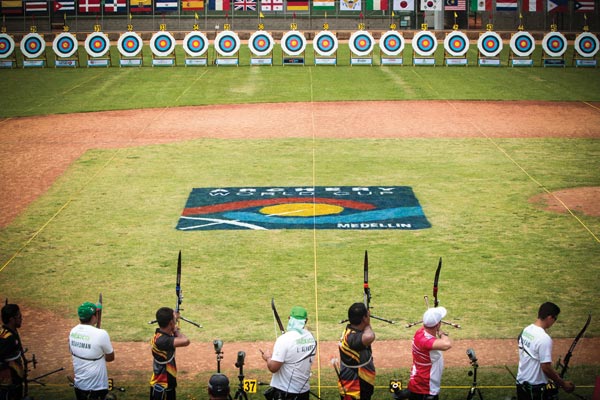Alistair Whittingham shares his top tips for combating competition nerves and settling into the game quicker

At international events there is normally a practice facility and many/all of the archers will be there before the round starts to let off some steam and those bad shots!
Q. I get really nervous before a competition, and it takes me a few ends to settle into it. Those ends are never as good as the ones I know I can shoot outside of a competition, and I think it’s the nerves affecting them. What’s the best way to settle in faster?
A. Every performer knows that feeling of excitement (or nerves) that they feel before the start of a competition. On the one hand we all need a little bit of emotional arousal to perform at our best, but many feel it is a negative and the nerves get out of hand, leading to poor performance.
The reason we have poor performances due to nerves is twofold: firstly, we are not ready to compete, and secondly, there is a mismatch between our expectations and our reality. At international events there is normally a practice facility and many/all of the archers will be there before the round starts. Some shoot as many arrows as they can while others shoot not very many and this is to overcome the first of the two issues, which as you will see affects the second. If you don’t have access to unlimited practice before a round, then you need to use the practice ends you are given wisely.
The primary purpose of the practice ends is to shoot your shot. You will often see archers shoot six arrows in the two minute practice ends indoors, with the first three or four not at the target face. This allows them to focus on finding the shot that they want, not basing what they are doing on whether the arrow lands in the 10.
The second purpose of practice ends is to set your sight so you are shooting in the middle, but this can not be achieved if you are not shooting your shot. So, tick the first box and then move on to the next.
Once your sight is set and you are shooting arrows in the middle assess your expectations versus reality, pick a score or group size for the opening two ends that is realistic to your ability and also how you have performed in the practice ends. There is no point, if you’ve shot a mediocre practice, in ignoring where you are actually up to and putting huge pressure on yourself to perform in a way that you know is beyond you. Paradoxically, very good practice can have exactly the same negative effect of making you expect a performance you are not capable of. If you manage your expectations with the reality of the situation you are in then you will learn to ease into the performance and not suffer the poor starts due to nerves that so many do.
This article originally appeared in the issue 115 of Bow International magazine. For more great content like this, subscribe today at our secure online store www.myfavouritemagazines.co.uk

